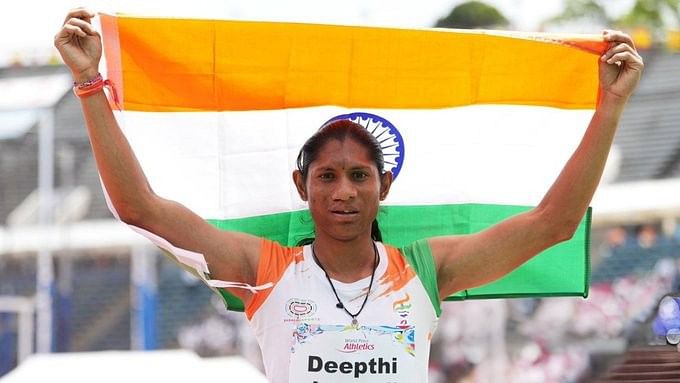
Deepthi Jeevanji.
Credit: X/@ParalympicIndia
New Delhi: For a long time, Deepthi Jeevanji's parents were taunted by fellow villagers for having a 'mentally impaired' child.
But now they are counting the compliments as the same bunch converged at their modest house in Telangana's Kalleda hamlet to celebrate her world record-beating gold medal in the Para Athletics World Championship in Kobe, Japan.
Born to daily wage labourers at in Warangal district of Telangana, the 20-year-old Deepthi on Monday clinched gold with a world record time of 55.07 seconds in the women's 400m T20 category race. She also qualified for the upcoming Paris Paralympics.
The T20 category is meant for athletes who have intellectual impairment.
Deepthi's coach Nagpuri Ramesh said her parents were at the receiving end of taunts from the villagers, who would often say that she will never get married since she is 'mentally impaired'.
"Deepthi's parents were daily wage labourers and they were struggling to run the family. On top of that they faced constant taunts from the villagers that a mentally impaired girl cannot get married," Ramesh told PTI from Hyderabad, where Deepthi trains currently.
"After Deepthi won gold in the Hangzhou Asian Para Games last year, the scenario changed. Now, the same villagers are praising them for being parents of Deepthi. They told me this when they came in Hyderabad after the Para Asian Games.
'They told me even the district collector and politicians of the area visited their house which was a shock to them, considering how things have changed."
She had won gold in 400m T20 category in the Hangzhou Para Asian Games with Asian record time of 56.69 seconds.
Deepthi's father J Yadagiri and mother J Dhanalaxmi were so poor that they did not even have money to afford bus fare to send their child to Hyderabad from Warangal when Ramesh wanted to train her.
"She was spotted in a school meet through a PET teacher in Warangal. When I told them to send Deepthi, they said they didn't have money for bus fare. I told them to just board a bus and give me the phone number of the conductor.
"After that I explained to the bus conductor to let her board the bus and told him I will pay the fare when she reaches Hyderabad. During the 130km journey from Warangal to Hyderabad I kept calling the bus conductor inquiring about her safety."
Ramesh said Deepthi's parents had earlier sold their half acre land due to financial difficulties but they bought an identical piece of land with the Rs 30 lakh reward she got for winning the Para Asian Games gold medal.
"Deepthi's parents are now doing better. They have bought land with the money Deepthi got as reward for her achievements and they have started farming," said Ramesh.
After Deepthi was brought to Hyderabad, she was enrolled at the Sports Authority of India's Training Center in Hyderabad where Ramesh is a coach. She was studying in ninth standard at that time.
Ramesh, who is also the Athletics Federation of India's national junior team coach, said he had a tough time initially in training Deepthi because she could not communicate.
"You cannot teach her too many techniques as she is slow in learning things, If you do that she will get confused," he said.
Her parents once told Ramesh that Deepthi fell down from the roof of a building but acted as if she didn't feel any pain because of the inability to express her feelings.
Chief national badminton coach Pullela Gopichand also played a role in Deepthi's career.
It was Gopichand who suggested Ramesh to take her to the National Institute for the Empowerment of Person with Intellectual Disability in Hyderabad. After medical tests, she was certified as 'mentally impaired' and that allowed her to compete in para meets.
Gopi-Mytrah Foundation chipped in as her sponsor and funded two international events for her to get international license, which is a must for para athletes to compete.
"She competed in two tournaments, one in Morocco and another in Australia and she got her international license. Around Rs three lakh were spent in the two tournaments and Gopi-Mytrah Foundation funded it," said Ramesh, a Dronacharya awardee, who was also the coach of top sprinter Dutee Chand.